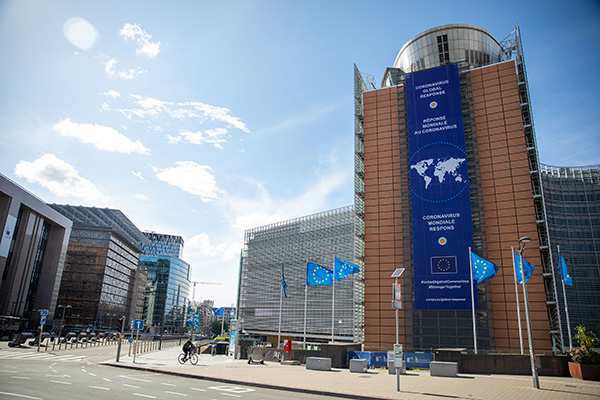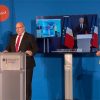Introduction
The coronavirus has been an unprecedented challenge for the world. The EU, an incomplete integration project with a very high degree of interconnectedness between nation states, was slow in responding at the very beginning of the crisis. Since both health and border management are mainly member-state competences, the primary reaction was to rally around the national flag. Once the scenario and the need for a coordinated response was clearer, the shaping of a ‘European’ response could begin.
Even if the Union has been criticised for a lack of solidarity –as in all other crises of the 21st century–, some of its institutions –mainly the European Commission and European Central Bank– rose to the challenge in March and took definite steps. Some of the political groups in the European Parliament called for united action since the early stages of the crisis, and ended up with a resolution asking for an ambitious plan that has been widely supported. The European Council, on the other hand, has already met (virtually) four times since the beginning of March to discuss the next steps forward. Now a decisive meeting is around the corner. Leaders will gather on 19 June to discuss the European Commission’s long-term budget proposal together with its economic recovery plan. The differences between member states will have an impact on the shape and size of the plan and set the final tone.
“(…) it is vital to understand all these dynamics before judging the EU’s performance while dealing with these multidimensional crises, or any others to come”.
The power battle in the European Council is very much connected to national politics. The heads of state and government have their own national politics to push forward. Party politics and coalition dynamics are important pillars of their decision-making mechanisms, in addition to public opinion in their home countries. For this reason, it is vital to understand all these dynamics before judging the EU’s performance while dealing with these multidimensional crises, or any others to come. Studying the competences and power dynamics could be a useful exercise right before the Conference on the Future of Europe begins.
Institutional and political dynamics: do we need a power re-shuffle?
The COVID-19 pandemic has had asymmetric consequences for various member states in the Union. The severity of the pandemic in a country also defines each country’s perspective and its expectations from the EU. This situation opens up the Pandora’s box about decision-making in the EU, the role of institutions and the power balance within them and between them. To adjust expectations, it is important to understand the logic of competences and the distribution of power between institutions. This requires a knowledge of the functioning of supranational institutions, which should also be completed with background information on national interests.
It is clear that the centre of gravity has shifted in favour of the European Council as a result of the multiple crises that the EU has faced in the 21st century. Having said that, the differences are at a historical high, with a significant degree of fragmentation, geographically and also ideologically. In addition, many governments are in coalition which makes it very difficult to come up with agreements that will please all the partners. The current practice is ad-hoc cooperation between countries, instead of the historical solid alliances of the past. Intergovernmental bargaining and the power dynamics between member states play an important role in defining what will become ‘the EU response’.
“The power dynamics should be revisited in the light of the Conference on the Future of Europe”.
The recently published Franco-German initiative for recovery is a very good example to understand the role national leaders play in the European decision-making mechanism. The German Chancellor, Angela Merkel, said that she had spoken to all the leaders in the European Council before agreeing on a compromise with the French President Emmanuel Macron. The initiative clearly set the scene in shaping the economic recovery plan of the European Commission.
When we are talking about national interests, there is the party-politics dimension and the interests of each government, depending on the electoral cycle. There is a gap between policies that enforce European integration (like moving forward with the fiscal union or coming up with a common health policy) and that will be politically beneficial for the politicians in office. If there is a poll on the horizon, the desire to please public opinion becomes very intense. In spite of this, politicians might have to invest in the future of European integration against the short-term interests of their own governments. That is not necessarily a virtue that is frequently found. We are see this situation in many countries, even if real leadership in times of crises requires the shaping of public opinion and not hiding behind it. There is a very thin line between the national interests of a country and the electoral interests of the political elite in office.
Positions in the European Council (and the Council of the EU) should be judged in light of all these dynamics. If you add to that that the members of the European Parliament are selected through national political parties and that the Commissioners are proposed by each country’s government, there is a further twist. National governments and political elites play a key role in the EU. They should rise to the occasion at times of crisis and open the way for communitarian policies for the greater good.
The future ahead
“The aftermath of the current crisis and its legacy will define the future of integration”.
The power dynamics should be revisited in the light of the Conference on the Future of Europe. In that debate, the expectations/competences gap should be addressed. In every crisis, the interconnectedness (economic, social and political) between member states becomes even more visible. It is clear that, completing the European integration project is not just needed for acting within the principle of solidarity at times of difficulty, but also because there is a need to have related instruments for the well-being of all countries. To be able to fulfil citizens’ expectations, the EU should have the necessary toolbox. However, this may well mean transferring further competences to the Union.
In every crisis the EU is expected to save the day. It also faces the question of ‘what is the future of European integration?’. Articles about the inevitable fall of the European project and the rise of nationalism rapidly make an appearance. Nevertheless, passionate observers of European politics know the answer: it has always been the crises that have pushed the European project forward. COVID-19 and its consequences are being identified as being the biggest challenge since the end of World War II. That is why the French President Emmanuel Macron recently called it a ‘moment of truth’. The aftermath of the current crisis and its legacy will define the future of integration. At the end of the day, democratically-elected national governments play a vital role in every step ahead.
This time it is not just the EU that is facing a huge challenge. The pandemic has only deepened the already existing problems and highlighted the flaws inherent to international organisations. It is clear that the world is undergoing a period of reconstruction and reform in global cooperation. The process is very much needed since the current system was built in the 20th century and it did not necessarily reflect all the needs of the present day. If the EU wishes to play a more influential role in the world –or must do so because of the White House’s lack of interest– its institutions must be firm. They should be reinforced not just with new competences that require Treaty changes but also with the political will of the politicians currently in office in each national capital. It is time to invest in the future, in the next generation.



